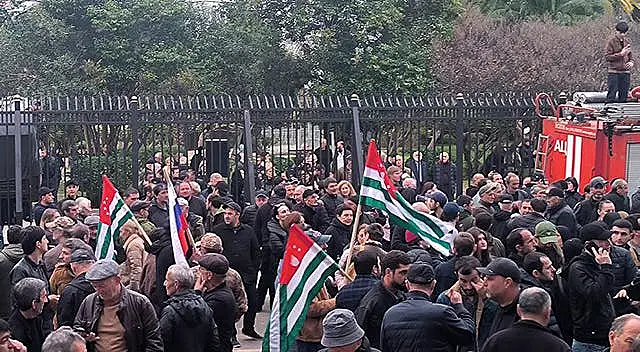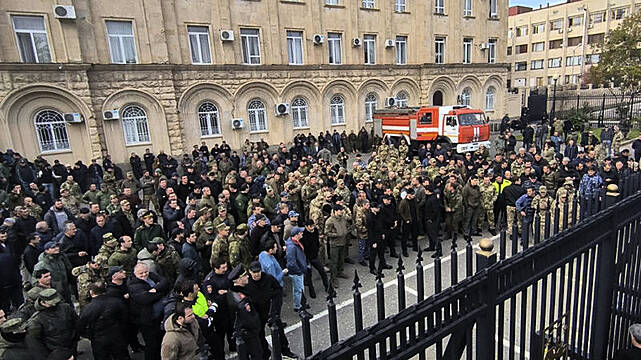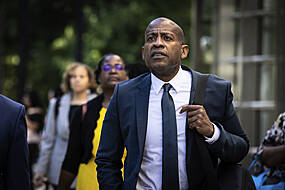Opposition protesters in Georgia’s breakaway province of Abkhazia have refused to cede control of key government buildings that demonstrators stormed to protest new measures allowing Russians to buy property in the area.
Abkhazian President Aslan Bzhania announced that he would step down and hold early elections if demonstrators vacated the region’s parliament building.
But crowds that gathered in the Abkhazian capital, Sukhumi, rejected the deal and opposition leaders said they would only accept Mr Bzhania’s unconditional resignation.
“None of us have come here for the sake of seats (in parliament),” former Abkhazian prime minister Valery Bganba told the crowd in a video livestreamed on social media.

“We came here to save our people, our country.”
At least 14 people were injured on Friday when opposition protesters clashed with police, Russian state news outlet RIA Novosti reported.
Legislators had gathered at the region’s parliament building to discuss ratifying measures allowing Russian citizens to buy property in the breakaway state.
However, the session was postponed as demonstrators broke down the gate to the building’s grounds with a truck and streamed inside. Some threw rocks at police, who responded with tear gas.
Most of Abkhazia broke away from Georgia in fighting that ended in 1993, and Georgia lost control of the rest of the territory in the short war with Russia in 2008. Russia recognises Abkhazia as an independent country, but many Abkhazians are concerned that the region of about 245,000 people is a client state of Moscow.
Opponents of the property agreement say it will drive up prices of apartments and boost Moscow’s dominance in the region.
Abkhazia’s mountains and Black Sea beaches make it a popular destination for Russian tourists and the demand for holiday homes could be strong.
The arrest of five opposition figures at a similar demonstration set off wide protests the next day in which bridges leading to Sukhumi were blocked.
Also on Saturday in Georgia’s capital Tblisi, the head of the Central Electoral Commission was doused with black paint at a meeting to confirm the results of the country’s divisive October 26 parliamentary elections.
Protesters gathered outside the commission’s building in Tbilisi, where officials announced that the ruling Georgian Dream party had won 53.93 per cent of the vote.
Opposition supporters have rejected the results amid allegations that the vote was rigged, an accusation that Georgian Dream denies.
The Saturday session was interrupted when David Kirtadze, a commission member from the opposition United National Movement party, threw black paint at commission chairman Giorgi Kalandarishvili.
Before the incident, Mr Kirtadze told Mr Kalandarishvili that the official results of the vote did not reflect voters’ “true choice”.
Mr Kalandarishvili responded by saying that the use of “pressure, bullying and personal insults” proved that there was no evidence of vote rigging.
When the meeting resumed, Mr Kalandarishvili was seen with a bandaged eye.
“It once again becomes evident that there is no tangible proof indicating that the elections were manipulated,” he told the audience.
European election observers have described the Georgian parliamentary elections as taking place in a “divisive” atmosphere marked by instances of bribery, double voting and physical violence.
Many Georgians viewed the vote as a pivotal referendum on the country’s effort to join the European Union. The bloc suspended Georgia’s membership application process indefinitely in June after the country’s parliament passed a “foreign influence law” that critics say mimics Moscow’s crackdown on civil society.
Critics have accused the ruling Georgian Dream, established by Bidzina Ivanishvili, a billionaire who made his fortune in Russia, of becoming increasingly authoritarian and tilted toward Moscow. It has recently adopted laws similar to those used by the Kremlin to crack down on freedom of speech and LGBTQ+ rights.
President Salome Zourabichvili, who has rejected the official results, says Georgia has fallen victim to pressure from Moscow against joining the European Union. Ms Zourabichvili, who holds a mostly ceremonial position, has urged the US and EU to support the demonstrations.
Officials in Washington and Brussels have urged a full investigation of the election, while the Kremlin has rejected the accusations of interference.







